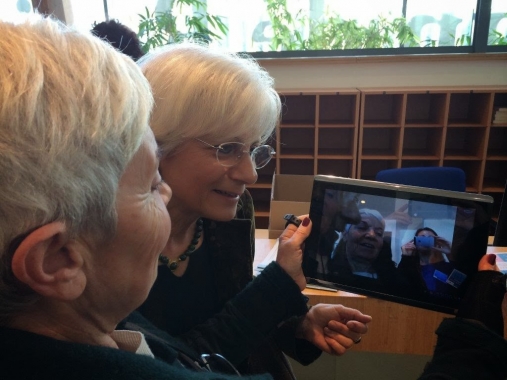Housing & technology for a better quality of life for the elderly
Brussels, 12 March 2014 | Social
The HOST project concludes with encouraging outcomes.
Can social housing today tackle daily life problems of elderly people? How can technology and housing enhance the quality of life? The final conference of the Host project held last week in Brussels, has provided the answers generated through the project to the questions above.
Read MoreAs the EU population is ageing and the 65+ age group represents 17% of the total European population- with estimation to grow to 44% by 2050- the European AAL Joint Programme attempts to enhance the quality of life of older people and strengthen the industrial base in Europe through the use of information and Communication Technologies (ICT).
Within this framework the Host project, launched in 2011, has been a setup of experimentations and exchange of practices between 4 European countries- Italy, France, UK and Spain- and enabling the dialogue between different models of social housing organisations, such as the French generalist model of social housing and the Italian and English specialised model and the collaboration between different actors, such has housing providers, universities and institutional actors.
During the Final Event experimentations’ factors and results were presented by the project partners providing an insight of personal experiences of elderly users that have taken part in the co-design workshops and experimentations. The end users were present themselves as well. Ms Rancs, one of them, involved in the project in France, reported on her experience:
“They gave us a room, empty, without windows and doors. They asked what we would change to make this the future apartment of an elderly and handicapped person.
Well we’ve said we would first of all need a door… And then we should put some windows, and how would we picture the windows? The windows should be low, otherwise the person in the wheelchair would not be able to see anything.”
The main project outcomes show that a participatory, bottom up approach to the application of new devices in a living environment, i.e. when the receivers of the service, in this case the elderly, are involved in the process of designing the devices according to their needs and expectations, there is a cost efficient approach that not only leads to the creation of more functional tools, but also contributes to the creation of new relationships among elderly living in the same community. Such an approach also strengthens the relationship between the elderly and the providers of health and social care services, thus responding to the problem of isolation and providing more effective response to real needs.
The final conference has also been an opportunity to share experiences and results with representatives from the European Union who have contributed to highlight future funding opportunities to support ICT for ageing and housing. An important point raised during the afternoon discussions was the need for more action: “enough experiments, enough studies, enough power point presentations, it is time to act” said Rosette Farrugia-Bonello from the European Association of Homes and Services for Ageing (EAHSA).
In order to make this action possible especially in times of financial crisis, there is a need to support the partnership between the private and the public sector, to make the future market more feasible and focus on people’s needs. This is an approach that, as proven within the Host project, reveals to be more cost effective, delivering general healthcare services based on challenging and innovative technological devices with the ultimate goal of enhancing the living conditions of elderly people.
* Find out more about the project



Leave comments